- Home
- Fannie Flagg
I Still Dream About You: A Novel Page 5
I Still Dream About You: A Novel Read online
Page 5
“Oh no, ma’am, I was just wondering if you had any weeds you wanted pulled today.”
“Weeds?”
“Yes, ma’am, when we drove by, I noticed you have quite a few weeds that need pulling.” The little person walked over to the living room windowsill, which came up to her nose, stood up on her toes, and sized up the lawn. “I’ll tell you what; I’ll pull the front yard and your side yard for a dollar.”
“You mean … pull up the weeds?”
“Yes, ma’am.”
“Are you sure you want to do that? That’s mighty dirty work for a pretty little thing like you.”
“Oh, I don’t mind the work. I like it.”
Mrs. Flower crossed her hands over heart and said, “Oh, honey, I don’t want you to have to do that. Why don’t I just give you a dollar? It was worth it just to get to see you at my door. You’ve just cheered me up so.”
The little person frowned. “Oh no, ma’am, I couldn’t take any money if I didn’t earn it.”
Mrs. Flower could tell the girl meant it, and she hated to have her leave empty-handed, so she sighed. “Well, honey, if you want to pull some weeds, go ahead, I guess.”
A few minutes later, when Mrs. Flower was busy cutting a piece of pie and preparing a tall glass of iced tea for her tiny unexpected visitor, her next-door neighbor, Pearl Jeff, the judge’s wife, came to the side screen door, still dressed and wearing her strand of good pearls from attending an earlier bridge club luncheon.
She said sharply, “Mae, do you know there’s a midget sitting in your yard?”
“Yes, I do. Come on in,” she said, wiping her hands on her apron.
The judge’s wife stomped in, looking very concerned. “Why is there a midget sitting on your front lawn?”
“Well, Pearl, she just showed up, knocked on my door, and said she was looking for work pulling weeds. I told her I would just give her the money, she didn’t need to pull my weeds, but she said no, that she wanted to pull my weeds, so what could I do? So, I said, ‘Well, if you want to, go ahead.’ So, she’s going ahead, I guess. I don’t know what to think, but she’s as cute as a button.”
The judge’s wife pulled back the curtains and observed the small person. “Well, my word, have you ever? How old is she?”
“I couldn’t say, she could be anywhere from six to sixty. I don’t know, how can you tell how old a midget is? I wouldn’t even know what to look for.”
Still peering out the window, the judge’s wife said again, “Well, my word, you just don’t know what to expect from day to day, do you?”
“No, you don’t. If you had told me at eight o’clock this morning that a real live midget would be knocking on my door today, I wouldn’t have believed you.”
The judge’s wife, still looking out the window, said, “Well, who would? It’s like having a pink elephant show up and sit down at your table for dinner. You don’t suppose she’s a gypsy, do you?”
“Oh no, she just lives a few blocks from here. Her mother’s out in the car waiting for her. I think she looks like a little teeny tiny Shirley Temple myself …”
TWO DAYS LATER, the judge’s wife called her neighbor on the phone.
“I’ll tell you one thing, Mae, your yard never looked better. I told the judge about the little midget girl who pulled your weeds, and he said when you saw her again, have her come over to our house. We’re just about eaten up with dandelions. Our poor yardman is so old and blind anymore, he never gets them all. All he does now is trim the hedges, mow, and leave.”
What the judge’s wife said was accurate. Mrs. Flower’s lawn had never looked better. It was as if someone had laid a fresh new green carpet in her yard with not a weed to be seen. As it turned out, little Hazel, being so close to the ground, could see the weeds much better than someone looking down from above. And she was fast: scooting on her little bottom across the yard, she could cover more ground in an afternoon than a grown man could in an entire day. As word spread, pretty soon, little Hazel Whisenknott was pulling weeds for everyone for blocks around and for most of the ladies in the judge’s wife’s bridge club. And they all agreed that once little Hazel Whisenknott had worked in your yard, the weeds didn’t seem to come back. It was like some mystical thing, they said, and they wondered if maybe she had some secret midget knowledge. Mrs. Jack Mann, over at Sixteenth Street, said she thought that Hazel might really be a leprechaun.
But in the meantime, although she was only eleven, little Hazel was saving every dime she made to one day send herself through business school, and by age thirteen, she had been interviewed by the Home & Garden section of the Birmingham News. Asked what constituted a good weed puller, she gave an answer that appeared under her photograph, captioned:
Little Hazel Whisenknott, The Weed Puller of Woodlawn, says, “Not only does a gardener have to love beautiful lawns, they also have to hate weeds.”
Her father had puffed up with pride and had bragged to his co-workers out at the Birmingham Ornamental Iron Company, “Only thirteen years old and already quoted in the paper!”
Hazel had been a success from the very beginning. In high school, she was voted president of her class and head cheerleader. At football games, when she ran out on the field dressed in a smaller version of the blue-and-gold Woodlawn High School cheerleader outfits, doing a series of back flips, the crowd would roar with delight, even those there to cheer for the other side.
After Hazel graduated from high school, her father took her to see a mechanic he knew, who rigged up a car for her with special hand pedals and brakes. She then started driving all over town and selling magazines from door to door, and with the money she made, she sent herself to business school at night and became a CPA and got her real estate license. Always ahead of the curve, she knew that after the war, housing would be in big demand. And so, in 1953, she set up a little one-room office and, six months later, hired Ethel Clipp, her first employee. Up until then, real estate had been mostly a man’s profession, but Hazel quickly changed that and hired only women. She gave them great benefits, and they loved her for it and worked doubly hard, and by 1955, Red Mountain Realty had opened eight new branch offices and was on the way to becoming the largest real estate company in the state.
Hazel also believed in promoting herself and had been an occasional guest on the popular Good Morning Alabama television show. On the afternoon of July 31, 1968, she walked into the WBRC television station manager’s office, looked him in the eye, and said, “Mr. Slinkard, I am by far the most unique individual you will ever meet. I even fascinate myself! So, I got to thinking that maybe I should have my own show.”
Several months later, after House Hunting with Hazel went on the air, he had to agree. The ratings shot through the roof. Hazel introduced people to new neighborhoods and new subdivisions they’d never known existed. She interviewed experts on obtaining a mortgage, buying, selling, renting, decorating, and landscaping. Suddenly, women all over Birmingham wanted to get into real estate, and people who didn’t even know they wanted to move started selling their houses and buying new ones. Hazel soon became a local TV celebrity and loved every minute of it. Sometimes, on her lunch hour or when she had nothing scheduled, she would make Ethel go downtown with her and stand on the corner of Twentieth Street, in front of Loveman’s department store, shaking hands and handing out business cards. After about an hour, when Ethel’s feet were killing her, Hazel just seemed to get more energized and would ask, “Don’t you just love people?”
Ethel, who had always much preferred cats to people, would reply, “Only in small doses.” Hazel, surprised, would say, “Well, I don’t know why—I just can’t get enough of them.” And it was true.
In 1971, Hazel informed Ethel she didn’t like being alone at night and was going husband hunting. And that year, when she went to the Little People of America convention, she found one and came home with a little husband. Little Harry, an Italian dwarf from Milwaukee, just like the rest of the world had fallen under Hazel’
s spell. It was a very good marriage—she adored him, and he adored her.
But years later, after Hazel died, Little Harry was devastated. He turned the business over to a management firm and moved back to Milwaukee to be with what family he had left; like everybody else, he was lost without her.
They all missed her. That smile lit up the room, and her heart was as big as the moon. Of course, Team Hazel couldn’t help but think of her every time the phone rang. Hazel had her favorite song programmed into all the cell phones. It was annoying to have to listen to “I’m Looking Over a Four-Leaf Clover” all day long, but nobody had the heart to change it.
So many things reminded them of Hazel. Even the color of their cars. Hazel had worked out a great leasing deal with the Mercedes dealership, for all her agents to get a brand-new blue Mercedes every year. Hazel liked blue; she said it reminded her of her other favorite song, “Blue Skies.” Hazel always did love a happy song, and a happy client.
One of Hazel’s biggest assets in business was her ability to compromise. Negotiating the sale price of a house, when she was within range of the exact price she wanted, she would bang the table with her little fist and exclaim, “Close enough!”
“Always leave everybody thinking they got a little something,” she said. Hazel’s motto for selling a house: “Put its best face forward. Move it fast. Don’t let it linger.”
Good Timing
Tuesday, October 28, 2008
AT FOUR A.M., JUST AS MAGGIE HAD FINALLY DRIFTED OFF, THE loud beeping of a garbage truck backing up in the alley woke her. As she lay there in the dark, looking up at the moon outside her window, for some reason, she began to think about the Whirling Dervishes again. Where was Turkey anyway? And why did the word “Ottoman” come to mind? Was she thinking about the country or the footstool? Oh Lord, just another regret. She should have gone to college instead of charm school. She had learned how to gracefully enter and exit a car and how to hold a teacup correctly, but not much about world geography. Charm used to be so important that they taught it, but now Maggie, who had made all A’s in the subject, found that even she was beginning to run out of charm. Real estate, as it was today, could kick the charm out of anybody.
She had personally been bitten by several mean cats, numerous dogs, a hamster, two parrots, and a ferret. She had opened attic doors and had bats fly up her dress and get caught in her hair, fallen down slippery basement stairs, and dropped Open House signs on her foot. And she had almost been terrified to death when a seller had failed to mention the eighteen-foot pet boa constrictor left in the upstairs bathroom tub. That, plus having to deal with lookie-loos, real estate hustlers, and hysterical clients all day, could go a long way toward helping you forget your manners.
Lately, she had found herself speaking to the television set and saying, “Oh, shut up!” to whoever was talking at the moment. At present, she only said “Shut up” in the privacy of her own home, but who knows when she might slip and tell someone in real life to shut up? She would hate to think all her years of being polite and pleasant would be wasted, but she felt she was in real danger of behaving badly in public. Something was bubbling up under the surface. There had been other little signs along the way. A few months ago, she had deliberately recommended the worst restaurant in Birmingham to that rude couple from Virginia, and only last week, something even more alarming had happened. She had been sitting in her car, waiting for the light to change, when Babs Bingington, the Beast of Birmingham herself, had walked across the street, right in front of her. Of course, she knew Babs didn’t like her, but she didn’t know why. She had never done a thing to her. But still, she didn’t hate Babs like Brenda and Ethel did. She just avoided her as best she could. However, that day, as she sat there, she suddenly remembered what Babs had done to Hazel, and for a split second, she actually entertained the idea of stepping on the gas and running her over. She not only had a motive, but opportunity as well.
Luckily, in the split second she was thinking about it, a jogger ran across the intersection, and the moment passed. It was probably the first time in her life when indecision had actually worked in her favor, but she knew if she didn’t do something soon, she just might suddenly go berserk and wind up on the television show Snapped, which featured stories about women who had suddenly flipped out. She could see the CNN headlines running under a newsreel of her now, dressed in an orange jumpsuit and handcuffed, being walked into the jail: “EX–MISS ALABAMA RUNS OVER RIVAL REAL ESTATE AGENT.” Of course, she might have gotten away with it. Brenda always said that if Babs was ever murdered, every realtor in Birmingham had a motive and had threatened to kill her at one time or another. But the fact that she, who had a hard time even killing a spider, had actually thought of running someone over in broad daylight made her realize it might be time to remove herself from society, sooner rather than later. Red Mountain Realty had enough problems right now, and they didn’t need one of their listing agents going to the chair. Or worse yet, going completely insane and winding up in some asylum like poor Olivia de Havilland in the movie The Snake Pit. She was already talking to the television set. It was clear to Maggie that she was getting out, not only at the right time, but just in time. She was obviously not coping.
Growing Up in Dreamland
THE TRUTH WAS, MAGGIE REALLY HAD SEEN TOO MANY MOVIES AS A child. Not surprising, considering where she had grown up. Her father had been the manager of the Dreamland, a small neighborhood movie theater, and they had lived upstairs in a one-bedroom apartment, right next door to the projection booth, until she was eight. Looking back now, she supposed it had been somewhat unusual to enter and exit your childhood home through a movie theater lobby, but at the time, it had seemed normal to her and, in fact, quite wonderful.
To reach the apartment, she had to walk through a narrow, dark, carpeted stairway that was always cluttered with a few old broken spotlights and signs that read COMING SOON or HELD OVER ANOTHER WEEK and cardboard boxes full of black plastic letters for the marquee. Inside, the bare concrete-block walls were painted a pale mint green, with dark brown speckled linoleum tile on the floor. The bathroom had a claw-foot tub and one hanging light bulb. The kitchen was only a counter with a hot plate and a small refrigerator under the sink. It was not much to look at in the daytime, but at night, everything changed. As soon as it got dark, everything in the entire apartment, including herself and her parents, would suddenly start to glow a beautiful pink color from the reflection of the big neon Dreamland Theatre sign outside the window. Everything looked so pretty and cheerful. It had been like living inside a cartoon. And in the small alcove where she slept, there was a porthole in the wall she could open to look down and see the big movie screen downstairs. Every night, Maggie would lie in bed, watching the movie, and eventually be lulled to sleep by the whir of the movie projector next door, the voices coming from the screen, and the sounds of soft laughter coming from the audience below. And on hot summer nights, when her parents left the apartment door open to get a little breeze, she would hear the big red popcorn machine popping downstairs and the cash register bell ringing at the candy counter, and if she was still awake after the last show, when they had closed the doors, the sound of wooden seats being slammed up row by row. Then later, the roar of the big vacuum cleaner sucking up leftover popcorn and an occasional candy wrapper. All her life, the smell of popcorn and candy could transport her right back to that little apartment like it was yesterday.
She had loved growing up in the theater, but Maggie now suspected it was the main reason she had always had such a hard time facing reality. She’d read somewhere that the ages of one to four were formative years, so it must have affected her.
She had been raised in the era of Glorious Technicolor, the time of all the great movie musicals filled with cheerful songs and pretty people, where in the end, the boy always got the girl. And even though she was the only child of older parents, she had never been lonely. Her friends and playmates had been the movie stars, and she ha
d been perfectly happy. But then television became all the rage, and like so many other little theaters, the Dreamland closed down for good, and they had to move into a regular apartment. What a shock that had been.
Out in the real world, there was no background music playing, no popcorn and candy downstairs or pink glow at night. Or even a plot she could follow. Her father had managed to get another job, selling shoes, but money was always tight, and afterward, they had been forced to move from one gloomy, airless apartment to another, and Maggie began to feel lost and anxious. The world around her seemed so strange and unfamiliar. She didn’t say anything to her parents, but she had an uneasy feeling that somehow a mistake had been made, and she was not where she was supposed to be. She didn’t know where that place was until one hot muggy afternoon in August when she was ten. Her mother had just started working as a seamstress’s assistant to make a little extra money and had taken Maggie along to a dress fitting for a lady who lived in Mountain Brook. Maggie had never been to that part of town before, and when they drove up Red Mountain and she saw Crestview, the big, stately red brick Tudor mansion perched at the very top, the sight of it had taken her breath away. To Maggie, it looked like a castle in the sky, exactly like something right out of a movie. And as they descended down the other side of Red Mountain, into the cool, lush green world of Mountain Brook, with its leafy streets and ivy-covered brick and stone homes with long, rolling, graceful lawns, Maggie felt just like a kidnapped child who had been brought back home again. This was where she belonged, and she felt she could breathe again.
Of course, at the time, she was living across town in a dingy basement apartment with pipes on the ceiling, but even so, seeing Crestview had given her something to dream about. At night, she would lie on the lumpy pullout sofa and fantasize about the big house on the hill. She would imagine herself sitting on the side terrace, sipping tea, looking down on the city below. It had been a foolish childish dream, but it had soothed her during all those years of never being settled, of living in cramped, dark places. Over the years, Crestview became more than just a place to her; it became her ideal, something to strive for.

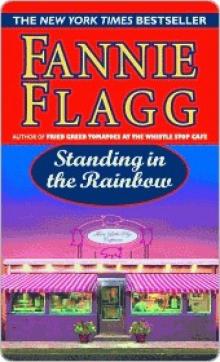 Standing in the Rainbow
Standing in the Rainbow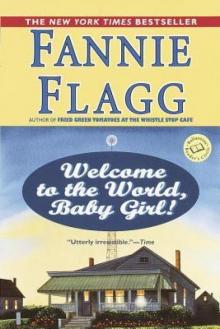 Welcome to the World, Baby Girl!
Welcome to the World, Baby Girl!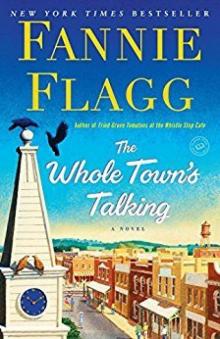 The Whole Town's Talking
The Whole Town's Talking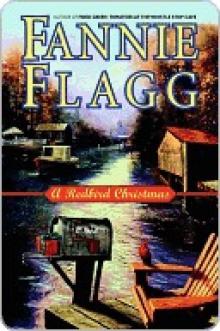 A Redbird Christmas
A Redbird Christmas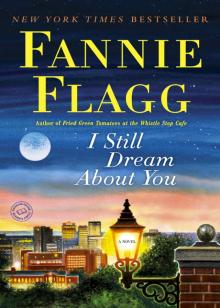 I Still Dream About You
I Still Dream About You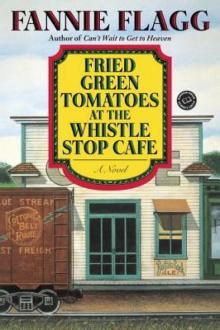 Fried Green Tomatoes at the Whistle Stop Cafe
Fried Green Tomatoes at the Whistle Stop Cafe Can't Wait to Get to Heaven
Can't Wait to Get to Heaven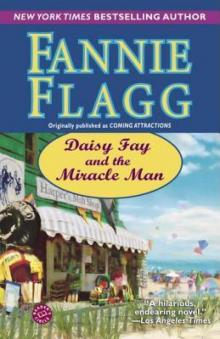 Daisy Fay and the Miracle Man
Daisy Fay and the Miracle Man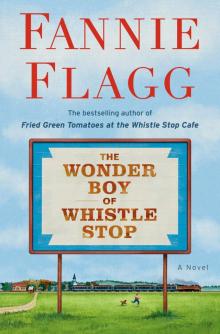 The Wonder Boy of Whistle Stop
The Wonder Boy of Whistle Stop The All-Girl Filling Station's Last Reunion
The All-Girl Filling Station's Last Reunion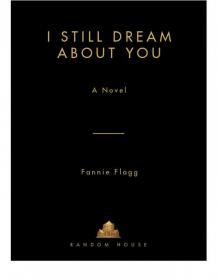 I Still Dream About You: A Novel
I Still Dream About You: A Novel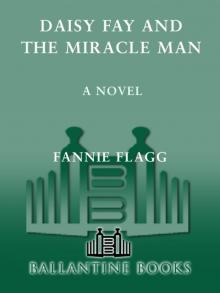 Daisy Fay and the Miracle Man: A Novel
Daisy Fay and the Miracle Man: A Novel